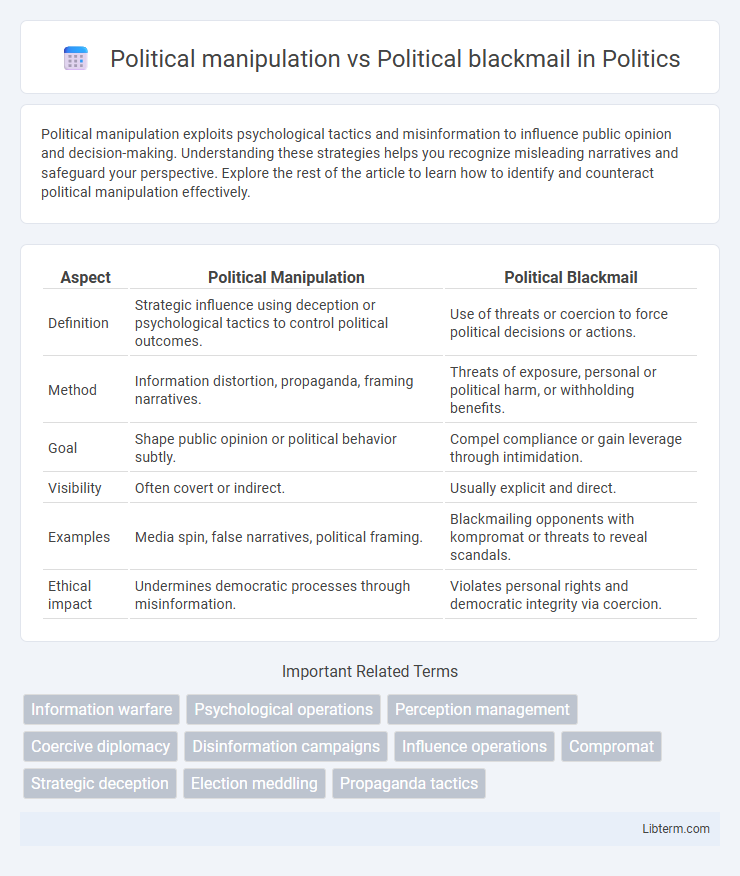Political manipulation exploits psychological tactics and misinformation to influence public opinion and decision-making. Understanding these strategies helps you recognize misleading narratives and safeguard your perspective. Explore the rest of the article to learn how to identify and counteract political manipulation effectively.
Table of Comparison
| Aspect | Political Manipulation | Political Blackmail |
|---|---|---|
| Definition | Strategic influence using deception or psychological tactics to control political outcomes. | Use of threats or coercion to force political decisions or actions. |
| Method | Information distortion, propaganda, framing narratives. | Threats of exposure, personal or political harm, or withholding benefits. |
| Goal | Shape public opinion or political behavior subtly. | Compel compliance or gain leverage through intimidation. |
| Visibility | Often covert or indirect. | Usually explicit and direct. |
| Examples | Media spin, false narratives, political framing. | Blackmailing opponents with kompromat or threats to reveal scandals. |
| Ethical impact | Undermines democratic processes through misinformation. | Violates personal rights and democratic integrity via coercion. |
Defining Political Manipulation
Political manipulation involves subtly influencing public opinion or political decisions through deceptive tactics, misinformation, or psychological strategies aimed at gaining power or control. It often exploits emotional triggers and cognitive biases to shape perceptions without overt threats. Unlike political blackmail, which relies on coercion and explicit threats, manipulation operates through covert persuasion to achieve its objectives.
Understanding Political Blackmail
Political blackmail involves coercing individuals or groups by threatening to reveal damaging information or take harmful actions unless specific demands are met, distinguishing it from broader political manipulation tactics that may include persuasion or misinformation. Understanding political blackmail requires recognizing its use of leverage based on sensitive or compromising data to force compliance, often undermining democratic processes and ethical governance. This form of coercion can destabilize political systems by fostering mistrust and eroding the integrity of decision-making institutions.
Key Differences Between Manipulation and Blackmail
Political manipulation involves covert influence tactics to shape opinions or actions without explicit threats, relying on persuasion and misinformation. Political blackmail uses direct threats or coercion to force compliance or silence opposition, often involving sensitive information or consequences. The key difference lies in manipulation's subtle control versus blackmail's overt intimidation.
Historical Examples of Political Manipulation
Historical examples of political manipulation include the use of propaganda by Nazi Germany to control public opinion and suppress dissent, exemplifying how leaders exploit media and messaging to maintain power. In contrast, political blackmail involves direct threats or coercion, such as the Watergate scandal where illicit activities and cover-ups were used to influence political outcomes. Understanding these distinctions highlights the strategic use of influence through subtle psychological tactics versus overt coercion in shaping political landscapes.
Notable Cases of Political Blackmail
Notable cases of political blackmail often involve threats to reveal damaging information to coerce politicians into specific actions, exemplified by the Watergate scandal where covert operatives sought to discredit opposing candidates. Another prominent instance is the 1970s Teapot Dome scandal, where government officials were blackmailed over corruption and bribery related to oil reserves. These cases illustrate how political blackmail exploits sensitive secrets to undermine democratic processes and personal reputations.
Psychological Tactics in Political Influence
Political manipulation often employs psychological tactics such as misinformation, emotional appeals, and cognitive biases to subtly shape public opinion and behavior without overt threats. Political blackmail leverages coercion, fear, and threats of exposure to force compliance or decision-making, creating a high-pressure psychological environment for the target. Both methods exploit vulnerabilities in perception and decision-making processes but differ fundamentally in the use of inducement versus intimidation to achieve political influence.
Ethical Implications of Political Manipulation
Political manipulation involves unethical tactics to influence public opinion or political outcomes, often undermining democratic principles and eroding trust in institutions. Political blackmail specifically uses threats or coercion to force actions, raising severe ethical concerns about abuse of power and violation of individual rights. Both practices damage political integrity, with manipulation obscuring truth and blackmail exploiting fear, highlighting the urgent need for transparency and accountability in governance.
Legal Ramifications of Political Blackmail
Political blackmail involves coercion to obtain political advantage through threats or exposure of damaging information, posing serious legal consequences including charges of extortion, bribery, and corruption. Legal frameworks in many jurisdictions classify political blackmail as a criminal offense punishable by fines, imprisonment, or disqualification from holding public office. Enforcement agencies actively investigate cases to preserve the integrity of political processes and maintain public trust in governance.
Protecting Democracy from Manipulation and Blackmail
Protecting democracy from political manipulation and political blackmail involves strengthening transparent institutions and ensuring robust legal frameworks that hold public officials accountable. Implementing comprehensive voter education programs and promoting independent media are critical to preventing undue influence and coercion in political processes. Effective safeguards against manipulation and blackmail preserve democratic integrity by fostering informed citizen participation and deterring corrupt practices.
Strategies to Counter Political Coercion
Effective strategies to counter political coercion include strengthening legal frameworks to criminalize political blackmail and promoting transparency in political decision-making processes. Empowering civil society organizations and leveraging independent media platforms heighten public awareness and hold perpetrators accountable. Implementing robust whistleblower protections and enhancing digital security also deter manipulation tactics by safeguarding sensitive information.
Political manipulation Infographic

 libterm.com
libterm.com